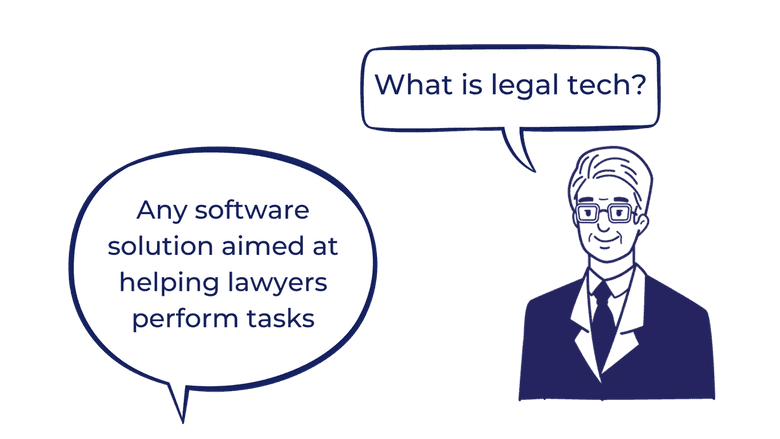Top 5 Legal Tech Trends for 2021
The five companies on the cutting edge of innovation in the post-pandemic legal industry.
Despite the rapid advances in technology over the past several years, the legal industry has been infamous for its resistance to change. However, complications from the COVID-19 pandemic have accelerated the adoption of tech solutions for many firms.
From video conferencing to automation, many trends have played a role in keeping lawyers afloat while adjusting to remote work. Although many firms are beginning their back-to-work transitions, onlookers speculate that these solutions will stick around.
What Is Legal Tech?

The term legal tech refers to any software solution aimed at helping lawyers perform tasks. Early legal tech innovations included simple tools like electronic records systems. However, the industry’s more recent inventions have progressed to tackle more specialized actions like case management, time-tracking, cross-team collaboration and more.
Legal tech vs. law tech
While many categorize any law-related software as legal tech, industry experts are quick to correct the conflation. Whereas legal tech refers to digital tools used by lawyers, law tech refers to software aimed at helping non-lawyer consumers. They may translate complicated legal jargon for the average individual, or they can help potential customers find legal help.
Like legal tech, law tech has also seen increased success in recent months. For example, the consumer-focused platform LegalZoom launched an IPO in June 2021, closing at 35% above its initial public offering price. However, for the purposes of this list, we’ll focus solely on trends within legal tech.
1. Cloud-Based Services

Cloud computing has been a growing trend over the past several years. At the start, law firms were skeptical of the technology. In addition to a general opposition to change, many also feared that transferring their work to the cloud might raise the likelihood of a data breach.
However, many services have gradually won over increasing numbers of organizations through convenience and airtight security. To top it off, the shift to remote work in the past year made switching to the cloud an obvious solution. In addition to allowing lawyers to access their work from anywhere, it also enables them to respond more quickly to clients’ needs.
Our pick: Clio

What do they do?
Launched in 2008, Clio has been offering cloud-based solutions for over 13 years. While mainly known for its cloud services, its web-based tool suite checks a lot of boxes for its customers.
Initially, it was aimed at individual lawyers and small law firms who struggled to handle administrative tasks. Not only does it allow lawyers to access their documents online, but it also assists in other areas like customer acquisition and scheduling. Clio also provides additional accessibility through integrations with other apps and mobile solutions.
What are they up to?
In April, Clio closed out its Series E funding round with an investment of $110 million, putting them at a valuation of $1.6 billion. They’ve also reached a user base of over 150,000 customers in 130 countries. CEO and cofounder Jack Newton told Bloomberg that the company would use the investment to focus on hiring, acquisitions and new product offerings. He also hinted at the possibility of an IPO in the near future, but not in 2021.
2. eDiscovery

eDiscovery companies aim to automate the discovery process, where both parties provide all of the relevant records and evidence. Just like cloud technology, tech firms have been pursuing this area for years. However, the rise in legal professionals working remotely has increased the need for features like Virtual Managed Review (VRM).
Over the years, Electronically Stored Information (ESI) has also expanded to include files like email, social media, cell phone data and digital audio and video recordings. eDiscovery tools allow lawyers to sift through this information quickly and easily. By helping them identify and sort through relevant data, it can free up valuable time for more complicated, hands-on tasks.
Our pick: Relativity

What do they do?
Founded as a software consultancy called kCura, Relativity has been a top player in the eDiscovery industry for roughly 20 years. Its software suite offers a variety of services, including case assessment, fact management, analytics and legal hold functionalities. While it’s expanded to offer cloud services in the past few years, it still provides on-premise software to clients who need it.
Relativity is one of the most established eDiscovery companies in the industry. In addition to serving 198 of the top 200 law firms in the US, it also provides services for the US Department of Justice.
What are they up to?
Although it’s been around for a while, Relativity has made a lot of big moves over the past few months. In March, it closed out an investment from the private equity firm Silver Lake, which valued the company at $3.6 billion. With previous investments in companies including Twitter, Airbnb and Expedia Group, Silver Lake seemed to be well-positioned to offer tech expertise in addition to funding.
In May, Relativity also acquired a New York-based startup called Text IQ. Founded in 2014, Text IQ uses artificial intelligence to help businesses and government organizations identify sensitive information. The acquisition will likely enable Relativity to further improve its eDiscovery software and dive deeper into artificial intelligence.
3. Regulation Monitoring

While relatively new, the regulatory technology (regtech) industry has been expanding at a high rate. Market Watch estimated its global market revenue at $2.3 billion in 2018 and projected it to reach $7.2 billion by 2023. Regtech has seen a lot of crossover with sectors like finance and healthcare as companies go to lengths to comply with regulations and restrictions.
For example, the EU’s updated General Data Protection Regulation (GDPR) instituted stricter privacy and security standards in an effort to protect EU citizens’ data. Since then, more countries have enforced their own restrictions, and many suspect that the US will follow suit. Because many law firms have access to large amounts of user data, they’ll have to take extra steps to make sure they’re in compliance with regulations.
Our pick: Libryo

What do they do?
Libryo was founded in London in 2016 as a legal database to grant users access to legal content and professional services. It’s mainly designed for compliance professionals and in-house lawyers to help them to stay updated with ever-changing regulations. In April, the company launched a new feature called Libryo Assess, which allows organizations to view their compliance status and risk levels.
What are they up to?
This past May, Libryo closed out a funding round of $1.87 million. The investment was led by Future Energy Ventures, a Germany-based venture capital firm that focuses on startups with the potential to redefine future energy. With a user base of over 15,000 across more than 75 countries, Libryo planned to use the investment to pursue further growth and expansion.
4. Artificial Intelligence

AI advancements have expanded across several industries in the past year. According to the global research company Gartner, artificial intelligence augmentation will create $2.9 trillion of business value in 2021. The legal tech industry is no exception to the reach of AI.
Some legal professionals have criticized the hype around artificial intelligence in the industry. For example, in October 2020, Contractbook director of business Anders Spile published an opinionated article about why new innovation in legal tech is overrated. He argued that the outdated method that many lawyers currently use have plenty of room for improvement before AI comes onto the scene. However, that doesn’t change the fact that legal tech companies are increasingly investing in artificial intelligence to enhance their software solutions, from eDiscovery to contract analysis.
Our pick: Luminance

What do they do?
Luminance was started in 2015 by a group of mathematicians from the University of Cambridge. The founders developed a proprietary technology called the Legal Inference Transformation Engine (LITE) which powers the platform. The engine is built from pattern recognition, unsupervised and supervised learning techniques.
While its value is rooted in artificial intelligence technology, its features overlap with many other legal tech products. For example, it offers services including eDiscovery, M&A due diligence and portfolio analysis. Although it’s relatively young compared to its competitors, it’s gained a lot of traction over the years. Its customer base stretches across 300 organizations in 50 countries.
What are they up to?
Luminance closed its Series B funding round over two years ago, in February 2019, with a $10 million investment. Over the years, the company has received several awards for its innovations. For example, in April 2021, it earned a spot in the Tech Nation Future Fifty, a UK program aimed at recognizing and helping promising tech startups. In its earlier days, it also won a Queen’s Award for Enterprise and was named a World Economic Forum Technology Pioneer.
5. Virtual Collaboration

Law firms have famously outpaced other industries in returning to work. According to June data from Kastle Systems, the average law firm saw an occupancy rate of 52.3%, compared to 32% across all industries. However, more lawyers started working from home last year than ever before, and some speculate that the trend will continue.
In an effort to reduce overhead costs, some law firms may trade their offices for a combination of remote work and unassigned workspaces. Visiting an office can start to feel like an unnecessary inconvenience for clients as well, leading lawyers to offer more regular virtual meetings. While many of these will continue to take place over platforms like Zoom or Google Meets, video conferencing for the legal industry may also gain popularity.
Our pick: Legaler

What do they do?
Legaler is a video conferencing app built specifically for lawyers. While it was founded in Australia, it’s hosted on servers in the US. The application operates in-browser and allows users to schedule, host, record and archive video meetings. It also includes several value-adds for lawyers in particular, including integrations with Clio, Office 365 and Google. Other features include allowing users to operate multiple calls at once and to set up their own booking pages.
What are they up to?
For all of 2020, Legaler offered free full-featured plans for law firms made up of 10 or fewer employees. In October of that same year, the company launched a non-profit initiative called Legaler Aid. The new platform allows social justice litigants to find pro bono lawyers to help them. It also enables the litigants to raise money to cover other costs associated with the lawsuit. To cover operation costs, Legaler Aid retains 3% of crowdfunding and charges law firms a monthly fee to access the platform.
The information provided herein is for general informational purposes only and is not intended to provide tax, legal, or investment advice and should not be construed as an offer to sell, a solicitation of an offer to buy, or a recommendation of any security by Candor, its employees and affiliates, or any third-party. Any expressions of opinion or assumptions are for illustrative purposes only and are subject to change without notice. Past performance is not a guarantee of future results and the opinions presented herein should not be viewed as an indicator of future performance. Investing in securities involves risk. Loss of principal is possible.
Third-party data has been obtained from sources we believe to be reliable; however, its accuracy, completeness, or reliability cannot be guaranteed. Candor does not receive compensation to promote or discuss any particular Company; however, Candor, its employees and affiliates, and/or its clients may hold positions in securities of the Companies discussed.
